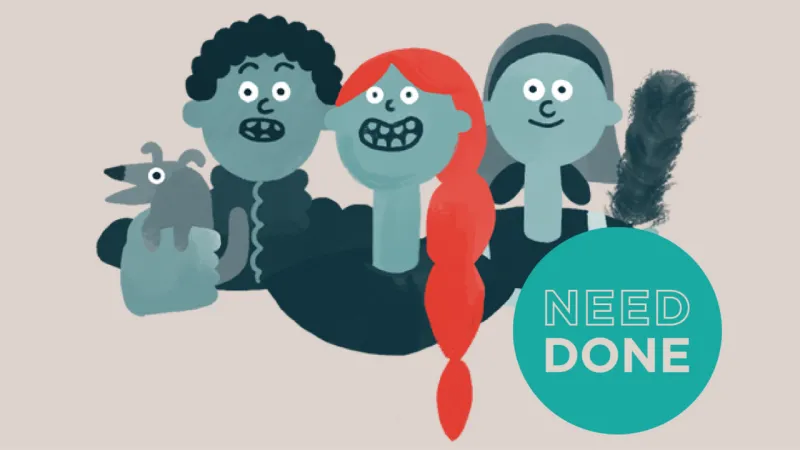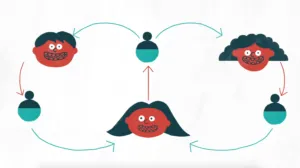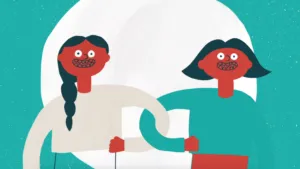NEED/DONE
NEED/DONE gives parents instant access to backup support their friends use and trust

Project Description
THE PROBLEM
Stress. Life as a modern day parent is incredibly stressful. Parents are trying to juggle home and work, with very little support. Especially working mothers - who are the ones who tend to shoulder the added burden of child, parent and home care. What's worse is that most are doing this alone, away from family and community. And reliable backup resources are hard to find.
This stress is driven by the daily "everything else"—the stuff that crops up related to child, elderly parent and home. The kind of stuff that simply can't be ignored, or entrusted to just anyone. The planning of birthday parties, taking care of elderly parents, the organizing, coordinating, the pick-ups, the endless errands...
People could use some help with that.

OUR SOLUTION
NEED/DONE meets a working parent’s most urgent need: it gets them instant access to backup help they can trust, for child and home-related tasks. This help is peer-sourced and comes from people their friends use - so support they can trust. Unlike other on-demand platforms in the “Sharing Economy,” NEED/DONE leverages a parent's own network to source this valuable task force. That's our twist.

HOW IT WORKS
You join NEED/DONE by bringing in a trusted Go-to (can be a sitter, a dog-walker -- anyone you trust with kid and home) and connecting with another parent friend. You now have access to each other’s Go-tos (except for the hours that Go-to has committed to you—we block those from view to keep them protected)!

You can use the app anytime to ask for help with anything from taking the kids to a museum (so you can finally take a nap,) to selling that old couch on Craigslist. And with each task, you select who you want the request to go out to—because every task might need something different. Maybe you only trust your friends’ Go-tos for babysitting, but can open it up to the extended network for more general stuff, like cleaning the gutter or putting a shelf together. You’ll get a notification when someone wants to help, and can hire them on the spot. It’s that easy!
And of course, the more you grow your NEED/DONE network by adding friends, the more support you have.

With NEED/DONE, parents get unprecedented access to the exact kind of support they trust; and they can access it all with the push of a button. The app is faster / streamlines and simplifies a process that normally takes them hours. Other awesome features include instantly rating Go-tos, paying through the system like Uber, and splitting requests with other parent users (nanny-share, anyone?).
HOW DO WE COMPARE WITH WHAT EXISTS IN THE MARKET?
Well, nothing comes close. Most fall short on either convenience or trust. Even our biggest competitors. For our competitors, “trusted help” means company-vetted strangers. For us, it means the people your parent friends recommend and use themselves.
NEED/DONE provides truly trusted help, at the push of a button. We’re actually a hybrid of a sitter app like Care.com, and Taskrabbit—with the ability to serve both kid and home needs with the same trusted task force.
OUR TEAM
Our team’s experience as parents and professionals gives us a clear advantage.

CEO and Co-founder, Leslie Walker has 20+ years of experience across technology, branding and management; she manages the NEED/DONE team & and is responsible for developing both product and brand. She’s a globally recognized and award-winning digital and marketing executive who’s created campaigns for Nike, VW and products for Google and Coca-Cola that speak to millennials and women the world over.

Co-founder Rachael Ellison, professional consultant, has 7+ years of experience consulting for major corporations on working parenthood and is a nationally recognized thought leader on the subject.

Karl Ackermann has 10+ years of experience designing innovative solutions for clients like Apple, and Google; he oversees the product development, and has worked with Leslie for the past 5 years on creative brand-led solutions that help people.

Alex Paparizou is an experienced freelance copy-editor and proofreader. She has also spent time on the supply side of on-demand cultures as a sitter and Taskrabbit worker; she runs day-to-day operations and gives us valuable insight into the Go-to provider’s experience.
WHAT WE'VE ACCOMPLISHED SO FAR:
A whole lot.
- We ran a pilot last year, facilitating 75 completed tasks in two weeks, operating out of NEED/DONE HQ—Leslie’s kitchen, Brooklyn NY.
- Our pilot group includes Fast Company and Working Mother Magazine editors
- We demoed, interviewed and signed-up users and Go-tos at NEED/DONE organized "Speed-Sitting" events in the area.
- We built out our US/India-based team, website, and demo.
- We have over 850 people on our sign-up list
- We've even had NPR affiliate, WNYC, air a 4-part podcast series on NEED/DONE this past August. (It’s called “Taking the Lead”; check it out!)
So now we're ready for launch in Brooklyn.
WHAT WE NEED
We’re currently in the process of finalizing our MVP—a more automated, scalable version of our first effort— for our launch in Brooklyn. We will be migrating our beta group over and adding up to 250 more parent users to the network, alongside 250 of their recommended go-to sitters.
- $18,000 will allow us to finish the app for launch. We plan to launch it strategically in one of NY’s most densely parent-populated neighborhood, BoCoCa, Brooklyn, on January 1st, 2017. Otherwise, we won’t be able to launch for another 9 months—the beginning of the next 17/18 school term (greatest help needed during school term)—and lose valuable time and all the momentum built to-date.
- $32,000 will enable us to move operations into a better equipped space to give our dev team the resources needed to work 24/7 post launch to work out bugs and speed up implementing new features (like splitting payments with other parent users) to grow our user base.
- $50,000 helps us boost growth of our user base even further with an aggressive marketing campaign over the first five months post launch so we're able to hit critical mass.
- $320,000 helps us firmly establish ourselves in our beachhead market (Brooklyn, NY) and secure key strategic partnerships which enable us to launch in our second market (greater NY, Boston, SF or LA) by 2018.

They say it takes a village… So we’re giving all stressed-out and sleep-deprived parents out there, their village back. We’re determined to create something that potentially disrupts the parent market AND provides relief to millions of parents worldwide.
And to pull this off, we need your help.
Updates
The Campaign FAQs
FAQs
What kind of help can parents get?
Anything from picking up the kid after school, to running an elderly parent to the their dr's appointment, to organizing or helping plan a birthday party, to selling stuff, organizing photos or researching a summer vacation online. Whatever they can use some backup for.
As working parents, we wanted to create an easy way for busy parents to ask for help from trusted "Go-to"s, and get that help more immediately - without all the usual calling, stressing, pleading—sometimes begging—and general back-and-forthing it takes to get the help you need when you get stuck / could use a hand.
How does NEED/DONE make money?
A 10% NEED/DONE fee is built into our standard Go-to sitter rates. And we will charge a modest monthly subscription fee ($15-20,) to cover our costs as our user base grows. We are waiving this fee for all users for the first three months—to give users a chance to try it with friends, and see how it works for them.
What revenue stream are you basing your current business model on?
Transaction and subscription for now. Later, we are looking to explore partnerships, enterprise, data analytics and advertising.
What are the rates?
We’ve determined three categories of jobs, each with their own standard rates. The parent user selects the job category each time they create a new job.
| SITTING: | $18/hr for 1 kid | $20/hr for 2 kids | $22/hr for 3 kids |
| DIGITAL/ONLINE PA: | $15/hr | ||
| LIVE PA: | $20/hr |
How does payment work?
All payment is made through the app. The app allows users to use a card or connect their Paypal account. Once a week, parent users are charged and Go-tos are paid out for all jobs marked "complete" that week.
How often are people using NEED/DONE?
In our pilot, people were using the Go-tos for childcare twice a month, 3 hours at a time, at an average rate of $20/hour. But once the parent user began to understand how they could offload a whole lot more to this trusted Go-to task force (running errands, doing research, decluttering, selling stuff online, housesitting, caring for an elderly relative - "the everything else",) the job requests started coming in at a higher rate.
How does this all work from a Go-to’s perspective?
When a Go-to logs on to the app, they see a stream of to-dos that parents in their network need help with, and are able to ask the parent questions, and apply to help out. They will get notifications with each new request from parent users who've reached out to them, and are able to accept or decline immediately. The typical NEED/DONE Go-to is a millennial and/or part-time nanny looking to supplement their income. NEED/DONE gives them control and flexibility, and the opportunity to do a variety of jobs besides babysitting.
What about stealing?
It happens. So we decided to look into it, and tackle the issue by designing functionality that helps deter the behavior.
In our pilot, 1 in 20 parent users (5%) tried to get Go-tos to work for them outside the system. So we doubled it to 10%, and accounted for this in our projections. Some of the specific features we designed to protect the community from the bad apples include:
- Whenever a parent invites a Go-to to join their parent network, they have to option to block out pre-agreed, regular commitments already in place. The Go-to approves that schedule when they join, and they won’t see job requests from other users at those times.
- Most of the parent and Go-to communication happens through our in-app messenger.
- Phone numbers are only visible when a job is active—that is, from the time a Go-to is hired until they complete the job.
By tracking “leakage” (aka stealing) in our pilot we stumbled on a nice discovery; the Go-tos themselves - the recipients of these propositions- tend to naturally monitor this problem for us. When propositioned, most are unlikely to take up a user’s offer to work outside the system for a better rate or regular hours. They’re not motivated to do so—as NEED/DONE represents an additional source of income for them, offering them something others don’t: easy access to more clients and greater flexibility, in the convenience of an app.
Are people comfortable sharing their resources with others?
At first some aren't. Which is why we encourage people to try NEED/DONE out by sharing a sitter they don't depend on as much (like a date-night sitter.) But once they realize that the pros of sharing resources (peace of mind) clearly outweighs the freaked out panicky feeling you get when you have to start from scratch to try and find a friend's on the fly, they see the benefit of sharing.
Risks & Opportunities
Risks:
-Time-
Time is not on our side. We’ve put a lot of time into researching and testing a model we feel really addresses what a parent needs, but there are other players in the market who would gain a lot from our insights, and capitalize on the work we’ve done. To put off the launch by another 9 months exposes us to competitors who would likely apply our findings more superficially to their offering.
-Bigger fish-
There's always the chance a giant platform (Facebook Messenger, Amazon, Care.com, Taskrabbit or Uber) looking to curry favor with this lucrative parent market will try to do what we are doing. But by building a brand that is fundamentally grown out of people's personal networks (like Linkedin,) we think it's hard to create a qualitative offering out of any massive user base once strangers -who are vetted by the platform- or people who don't serve this specific purpose already populate the user base of these much better established platforms. Our trusted task force network is made up exclusively of people introduced into the network by friends.
Opportunities:
-To learn-
By keeping an eye on other platforms whose models are more localized, like Nextdoor, we learn a lot. Nextdoor’s localized market-to-market expansion has already taught us a lot about seeding and growth strategies. Given that their trusted resource are made up exclusively of neighbors, provides us with an opportunity to identify this group’s limitations, and strengthen NEED/DONE’s offering by filling in the many more day-to-day gaps that neighbors can’t when it comes to caring for tasks related to kids and home.
Both Nextdoor and All-set, another competitor who offers local, community-driven services as well, validate the importance of community. Both have inspired and reinforced the need fto keep growing ours.
Both the above platforms, though not fundamentally designed to extend themselves to kid care present themselves as interesting companies to partner with down the road. Sitter.note, a strong competitor specifically in the childcare support category, could also be a good potential partner as we share an understanding of this parent’s need for streamlined, centralized efficiency. In fact, all platforms that support this time-poor parent’s needs across kid, pet, health, shopping, elderly and home care, could be good partners in the future. But for now, all are hugely valuable as we continue to track their progress, and learn from their mistakes - much as we have done with Taskrabbit and Care.com.
-To meet an unmet demand-
By identifying and unlocking a brand new category of need for this parent - the stuff they only trust themselves or trusted people to do - we are poised to disrupt a category worth $161B in the US alone.
In addition, we've been approached by others with similar, but non kid-related needs. This unmet need exists across several other demographics.
Every contribution deserves a gift. Get your very own handy NEED. HELP. NOW. gif + a Make-It-Happen shout out on our website
One nice turn deserves another. Get a NEED/DONE Post-it notepad + your very own handy NEED. HELP. NOW. gif + a Make-It-Happen shout out on our website
Thank you! For this kind gesture, get a ridiculously sturdy, high-quality NEED/DONE tote bag* + your very own handy NEED. HELP. NOW. gif + a personal Make-It-Happen shout out on our website. *(Random sock, meds, two overdue kid books, a phone, an old mint, a forgotten tampon, some loose change, the credit card you thought you’d lost not included.)
Your contribution gets us 10 hours closer to launch. And gets you: a NEED/DONE-blue, arguably teal, notebook + a NEED/DONE Post-it notepad + an analog complement to the app - "TO DO" / "DONE" sticker roll + your very own handy NEED. HELP. NOW. gif + a personal Make-It-Happen shout out on our website.
You have no idea how much this helps. Get NEED-DONE's official sleep mask + ear plugs + our complementary and recommended keep-you-kid-distracted sticker roll (50) + a 3-month subscription to NEED/DONE (to use as soon as we launch in your area) + a Make-It-Happen shout out on our website
This is big. For this, you get an official NEED/DONE statement bikini from our mix and match "To-Do List" series (1 boob says 'keep job' / other says 'feed kids' / 'have a baby' / 'fix boiler' / 'take grampa to the eye doctor's' / 'fix car' / 'walk dog' / 'get some sleep’ ) + a ridiculously sturdy high-quality NEED/DONE tote bag + a 6-month subscription to NEED/DONE (to use as soon as we launch in your area) + a Make-It-Happen shout out on our website.
Wilfred is a tiny, hard-working, grumpy workhorse (Shetland Pony, actually) who currently lives on a 10-acre working farm in the south of France. His sole job is to "mow" the grass. So NEED/DONE adopted him. This generous contribution makes you one of his official benefactors as well. For this you will receive a big thank you - a photo of Wilfred “smiling” + a 6-month subscription to NEED/DONE (to use as soon as we launch in your area) + a personal Make-It-Happen shout out on our website. Oh, and a bonus bag of carrots. “Wilf” loves a good carrot.
For this generous contribution, NEED/DONE can help you find your brand voice by exploring a market positioning, your mantra and develop a tagline that makes you stand out from the crowd. Guidance provided by our resident award-winning brand guru, CEO Leslie Ali Walker (leslieali.com) who's already helped build brands like Google, Nike, VW and Ikea in the US and abroad. Package includes five (5) half-hour SKYPE / phone sessions to help you work out how best to articulate what your product/brand does and what it stands for that tells the world what you do that’s awesome and different. You’ll feel more than ready to quit your job and set up your crowdfunding campaign on iFundwomen next! (This package includes a 6-month subscription to NEED/DONE as soon as we launch in your area + a Make-it-happen shoutout on our website as well.)
...WHEN YOU ACTUALLY CAN. For $10k, we’re anybody’s. Get a free LIFETIME subscription to NEED/DONE + a giant box of NEED/DONE swag including a NEED/DONE statement bikini + a ridiculously sturdy high-quality NEED/DONE tote bag + a NEED/DONE blue/arguably teal notebook + NEED/DONE Post-it notepad + your own handy NEED. HELP. NOW. gif + a Make-It-Happen shout out on our website.
(Discount - $500/mo- offered to those who'll carry our cards and stickers at your register.) Do you run a parent and kid-friendly business in Brooklyn? Our app offers support to parents who live in the hood. People who need things done as much as they need coffee, tailoring, gifts, bread and tools. Let’s support each other! Help us launch in January by becoming an official NEED/DONE sponsor, and your company logo will be prominently featured on the app’s home screen for ONE MONTH (you get to pick the month). NEED/DONE users will be lining up at your door!
Do you run a parent and kid-friendly business in Brooklyn? Our app offers support to parents who live in the hood. People who need things done as much as they need coffee, tailoring, gifts, bread and tools. Let’s support each other! Help us launch in January by becoming an official NEED/DONE sponsor, and your company logo will be prominently featured on the app’s home screen for ONE MONTH (you get to pick the month). NEED/DONE users will be lining up at your door! (Discount - $500/mo- offered to those who'll carry our cards and stickers at your register. —SEE $500 Reward Level)
Rewards
Every contribution deserves a gift. Get your very own handy NEED. HELP. NOW. gif + a Make-It-Happen shout out on our website
One nice turn deserves another. Get a NEED/DONE Post-it notepad + your very own handy NEED. HELP. NOW. gif + a Make-It-Happen shout out on our website
Thank you! For this kind gesture, get a ridiculously sturdy, high-quality NEED/DONE tote bag* + your very own handy NEED. HELP. NOW. gif + a personal Make-It-Happen shout out on our website. *(Random sock, meds, two overdue kid books, a phone, an old mint, a forgotten tampon, some loose change, the credit card you thought you’d lost not included.)
Your contribution gets us 10 hours closer to launch. And gets you: a NEED/DONE-blue, arguably teal, notebook + a NEED/DONE Post-it notepad + an analog complement to the app - "TO DO" / "DONE" sticker roll + your very own handy NEED. HELP. NOW. gif + a personal Make-It-Happen shout out on our website.
You have no idea how much this helps. Get NEED-DONE's official sleep mask + ear plugs + our complementary and recommended keep-you-kid-distracted sticker roll (50) + a 3-month subscription to NEED/DONE (to use as soon as we launch in your area) + a Make-It-Happen shout out on our website
This is big. For this, you get an official NEED/DONE statement bikini from our mix and match "To-Do List" series (1 boob says 'keep job' / other says 'feed kids' / 'have a baby' / 'fix boiler' / 'take grampa to the eye doctor's' / 'fix car' / 'walk dog' / 'get some sleep’ ) + a ridiculously sturdy high-quality NEED/DONE tote bag + a 6-month subscription to NEED/DONE (to use as soon as we launch in your area) + a Make-It-Happen shout out on our website.
Wilfred is a tiny, hard-working, grumpy workhorse (Shetland Pony, actually) who currently lives on a 10-acre working farm in the south of France. His sole job is to "mow" the grass. So NEED/DONE adopted him. This generous contribution makes you one of his official benefactors as well. For this you will receive a big thank you - a photo of Wilfred “smiling” + a 6-month subscription to NEED/DONE (to use as soon as we launch in your area) + a personal Make-It-Happen shout out on our website. Oh, and a bonus bag of carrots. “Wilf” loves a good carrot.
For this generous contribution, NEED/DONE can help you find your brand voice by exploring a market positioning, your mantra and develop a tagline that makes you stand out from the crowd. Guidance provided by our resident award-winning brand guru, CEO Leslie Ali Walker (leslieali.com) who's already helped build brands like Google, Nike, VW and Ikea in the US and abroad. Package includes five (5) half-hour SKYPE / phone sessions to help you work out how best to articulate what your product/brand does and what it stands for that tells the world what you do that’s awesome and different. You’ll feel more than ready to quit your job and set up your crowdfunding campaign on iFundwomen next! (This package includes a 6-month subscription to NEED/DONE as soon as we launch in your area + a Make-it-happen shoutout on our website as well.)
...WHEN YOU ACTUALLY CAN. For $10k, we’re anybody’s. Get a free LIFETIME subscription to NEED/DONE + a giant box of NEED/DONE swag including a NEED/DONE statement bikini + a ridiculously sturdy high-quality NEED/DONE tote bag + a NEED/DONE blue/arguably teal notebook + NEED/DONE Post-it notepad + your own handy NEED. HELP. NOW. gif + a Make-It-Happen shout out on our website.
(Discount - $500/mo- offered to those who'll carry our cards and stickers at your register.) Do you run a parent and kid-friendly business in Brooklyn? Our app offers support to parents who live in the hood. People who need things done as much as they need coffee, tailoring, gifts, bread and tools. Let’s support each other! Help us launch in January by becoming an official NEED/DONE sponsor, and your company logo will be prominently featured on the app’s home screen for ONE MONTH (you get to pick the month). NEED/DONE users will be lining up at your door!
Do you run a parent and kid-friendly business in Brooklyn? Our app offers support to parents who live in the hood. People who need things done as much as they need coffee, tailoring, gifts, bread and tools. Let’s support each other! Help us launch in January by becoming an official NEED/DONE sponsor, and your company logo will be prominently featured on the app’s home screen for ONE MONTH (you get to pick the month). NEED/DONE users will be lining up at your door! (Discount - $500/mo- offered to those who'll carry our cards and stickers at your register. —SEE $500 Reward Level)

